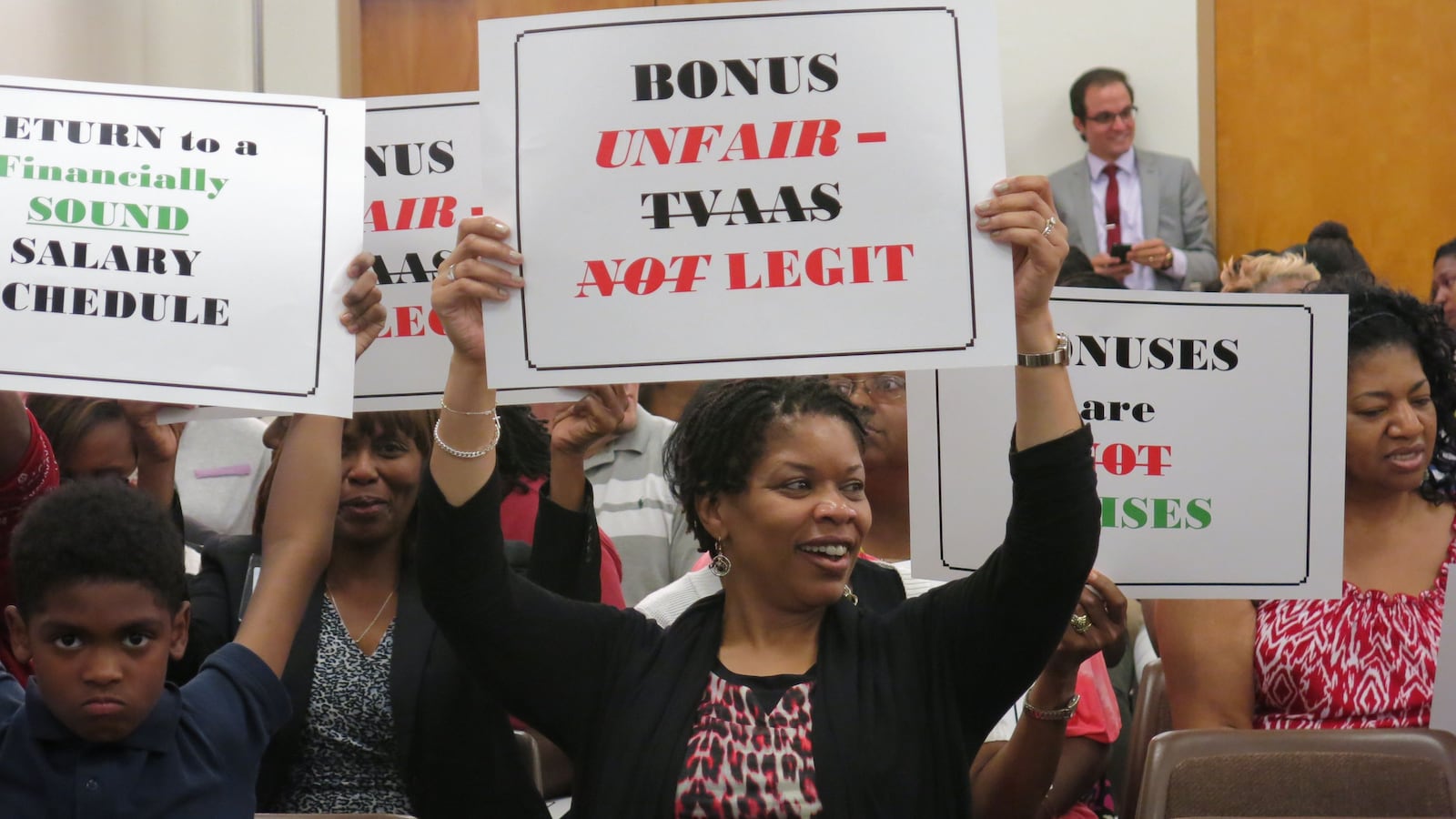The formula that Tennessee uses to rate teachers might be unfair — but it still can be used to decide whether they should get bonuses, a federal court has ruled.
The ruling, handed down this week in U.S. District Court in Knoxville, ends a heralded lawsuit that the state teachers union filed in 2014 challenging TVAAS, which the state uses to incorporate student test score growth in teacher evaluations.
In that suit, two teachers who had not received bonuses because of their TVAAS scores charged that the formula is too imprecise to be a valid measure of teacher quality. They also argued that the state’s use of the formula violates the U.S. Constitution by denying teachers their property — in this case, bonuses for “effective teaching” — without due process of the law.
The court ruled essentially that the teachers made a good point. But the ruling, which cannot be appealed, concludes that because no evaluations could take into account all of the teachers’ work, there’s nothing “irrational” about the state choosing to use growth in student test scores to grade teachers.
“While it may be a blunt tool, a rational policymaker could conclude that TVAAS is ‘capable of measuring some marginal impact that teachers can have on their own students,’” wrote Judge Harry S. Mattice Jr. in his ruling. “This is all the Constitution requires.”
The case’s permanent dismissal is a blow to critics of the state’s teacher evaluation policy, who hoped the court would roll back new rules that require student test scores to influence teachers’ ratings.
“National groups are right that we should not use value-added in high-stakes decisions. We know it is not right,” Tennessee Education Association President Barbara Gray said in a statement released Friday. “Now we need a true and fair understanding of what TVAAS is for lawmakers and the administration to change a flawed system.”
Representatives of the Tennessee Department of Education praised the ruling. “We were happy to hear that the judge has granted our motion to dismiss this case,” said spokeswoman Ashley Ball.
TVAAS is a complex algorithm that aims to isolate the impact of individual teachers on their students’ learning, as measured by state tests. One of the nation’s first “value-added” formulas, it has inspired similar efforts in other states.
TVAAS scores have been calculated since the 1990s but started being used to help determine ratings, bonuses and tenure status only since 2011, when Tennessee overhauled its teacher evaluation law. Under state law, TVAAS scores make up 35 percent of teachers’ ratings, with the rest based on in-person observations and “achievement measures,” which can include graduation rates, students’ AP or IB exam scores, or school-wide TVAAS scores.
The two teachers who filed the lawsuit, Lisa Trout and Mark Taylor, had strong ratings from classroom observations but TVAAS scores that were too low to make them eligible for bonuses from Knox County Schools. The district gives bonuses of up to $2,000 a year to teachers with strong ratings. Trout and Taylor charged that those scores should be discounted because only some of their students took the end-of-course exams used to generate the TVAAS scores.
Taylor’s rating was based on scores of just 22 of his 142 students, he said, rendering his TVAAS score meaningless.
Court documents reflect an exchange between William Sanders, the statistician who designed TVAAS, and Taylor’s parents, with whom he is acquainted.
Sanders was asked if a TVAAS score based on test scores of only a small fraction of a teacher’s students reflect a proper use of TVAAS. His answer: “For an overall evaluation of the effectiveness of the teacher to facilitate student academic progress, of course not.”
Mattice said in his ruling that he found the criticism compelling. But ultimately, the court ruled that Knox County had the right to hold back bonuses based on Taylor’s TVAAS. And he said the court did not have authority to tell the state legislature to come up with a different way to factor student learning into teachers’ ratings.
“It bears repeating that Plaintiffs’ concerns about the statistical imprecision of TVAAS are not unfounded,” the opinion reads. “However, this Court’s role is extremely limited. The judiciary is not empowered to second-guess the wisdom of the Tennessee legislature’s approach to solving the problems facing public education.”
The ruling comes as the influence of TVAAS on teacher ratings is in decline, at least for now. Last year, the legislature voted to temporarily diminish TVAAS’ role in evaluations as the state transitions to TNReady, a new test touted as more rigorous than the test the state had used since the 1980s. And after technical glitches crippled the first round of TNReady this month, Gov. Bill Haslam has proposed nixing TVAAS based on this year’s test scores in teacher evaluations.
Editor’s note: This story has been updated to include comments from officials with the TEA and the Tennessee Department of Education.

